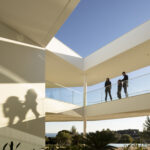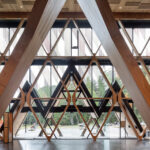Our recap of the major trends from Cersaie continues with a look at concrete and cement influences in Italian tile as well as both visually stunning and subtle-but-sophisticated new graphics, patterns, and artwork.
WELCOME TO THE CONCRETE JUNGLE
The trend toward emulating concrete and cement in porcelain stoneware doesn’t come as a surprise to anyone in the architecture and design community, given concrete’s overall popularity in the built environment. Many of the Italian tile houses have responded with styles that range from the polished variety to the freshly troweled look, and all of them can easily inject a bit of urbanism into both commercial and residential settings.

Atlas Concorde
Atlas Concorde: Dwell
While many of the concrete-emulating tiles are typically offered in large format for creating uninterrupted swaths, Atlas Concorde produces its latest faux concrete floor and wall tile line, Dwell, in both large format as well as plank and herringbone units. The porcelain tiles are available with a honed finish that evokes a resin-coated surface or a matte finish that more closely resembles raw concrete.

BRIX
BRIX: Brush
Designed by Lo Studio, Brush clearly has concrete leanings inspired by slurry casting and drying, complete with light and shade effects, particularly near the tile borders. Three finishes are available: Plain; Beat, which alternates between glossy and matte to evoke a worn surface; and Hammer, in which a hammer is manually used to create some surface texture. The tiles are offered in four colors and three sizes up to 29.5 square inches.

Ceramica Fioranese
Ceramica Fioranese: Evoke
Traces of pattern, imprints, and wear in concrete are what inspired the looks in the Evoke collection. The unpolished, rectified tiles come in a range of formats: 24 by 48 inches, 36 square inches, 24 square inches, eight square inches, 12 by 24 inches, and a bullnose that measures three by 24 inches.

Ceramiche Coem
Ceramiche Coem: Cotto Cemento
The large-format Cotto Cemento sports an irregular surface and variegated dusty colors. The unpolished, rectified tiles come in 24-by-48-inch, 30-square-inch, or 24-square-inch sizes as well as mosaic and bullnose versions. The 24-square-inch tile can also be specified treated for outdoor use.

Cerdomus Ceramiche
Cerdomus Ceramiche: Kendo
What sets Kendo apart from most other concrete- and cement-evoking tiles is that it sports trowel or spatula marks, much like those that create the surface texture on stucco. The rectified tile is offered in one standard size of 6.5 by 39.3 inches and in eight colors.

Del Conca
Del Conca: Upgrade
This cement-effect porcelain tile comes in four sophisticated colors and four sizes: 31.5 square inches, 23.6 square inches, 11.8 by 23.6 inches, and 11.8 square inches, each with a 10-millimeter thickness. For outdoor paver use, the 23.6-square-inch version is available with a 20-millimeter thickness.

Monocibec
Monocibec: One
Another cement-look product to recreate spatula streaks and marks, One is defined by subtle color variations in multiple directions. The rectified version comes in 31.5-by-63-inch, 23.6-by-47.25-inch, 31.5-square-inch, 23.6-square-inch, and 11.8-by-23.6-inch formats, while the natural-edge tile comes in 17.7- or 23.6-square-inch sizes. Mosaic on net is also available. One comes in five colors.

Settecento
Settecento: Gea
Settecento is offering its cement- and concrete-evoking tiles with some twists: in addition to the standard square, its Gea porcelain tiles come in a 16-by-19-inch hexagon as well as a 19-by-38-inch elongated hexagon. Decorative patterns are available for the square and regular hexagon tiles, and all come in five colors.
PATTERN PLAY
Those who like the look of wallpaper but desire more durability and cleanability will find something in the Italian tile market right now that meets all of their needs. A plethora of companies exhibited collections that boast designs ranging from abstract strokes and street art-inspired murals to ornate damask textiles and bold traditional or modern graphics.

Ariana
Ariana: Canvas
Canvas offers three decorative styles that each draw on textiles and wall coverings. For instance, Arabesque recreates classic damasks and brocades but with a hand-drawn quality and subtle shading. Meanwhile, Evanescence sports a more painterly, dyed appearance, and Used simulates worn upholstery fabric by presenting a pattern that comes in and out of focus. These large-format rectified tiles measure 23.6 by 47.25 inches to closely resemble uninterrupted wallpaper.

Ceramica Fioranese
Ceramica Fioranese: Cementine_Evo
These floor and wall tiles continue the trend we’ve been seeing over the last few years of diverse, intricate designs that can be mixed and matched for either all-over or patchwork-quilt pattern effects. But, instead of drawing on traditional or cultural motifs, Cementine_Evo takes its patterns from the optical fabrics of the ’60s, ’70s, and ’80s. The unpolished rectified tiles measure eight square inches.

Cerdomus Ceramiche
Cerdomus Ceramiche: Verve
Traces of geometric patterns are found in the decorative coordinating tiles for the Verve collection, almost evoking weathered frescos or cave paintings with a modern bent. Influenced by both terra cotta and concrete, the porcelain tile features markings and shade effects that add to the vintage feel and comes in four sizes and six colorways.

From left: Imola’s Kikodec, Kuni, and Mash Up.
Imola: Kikodec, Kuni, and Mash Up
Three new collections from Imola offer a feast for the eyes: Kikodec tiles (part of the Kiko line) sport irregular patterns that look as if they were hand-sketched with a pen or fine-point marker; Kuni wood-mimicking tiles can be decorated with custom graphics; and Mash Up includes a variety of patterns, from floral to stripes, as well as custom murals.

From left: Impronta Ceramiche’s Rayé and Arabesque.
Impronta Ceramiche: Couture
The white-body wall tile line Couture offers two fabric-inspired designs: Arabesque recalls a traditional damask pattern, while Rayé takes cues from variegated stripes. Both of the designs have textured grounds that beg to be touched. The tile comes in one size of 10 by 29.5 inches and is finished with a satin coat.

Lea Ceramiche
Lea Ceramiche: Naïve
Designer Patrick Norguet applies a crosshatch-like pattern that recalls carefully drawn pencil lines to Lea’s Slimtech ultra-thin laminated porcelain panels. The result looks astonishingly like wallpaper from afar; closer up, one can see — and feel — the lines as a subtle relief. The 5.5-millimeter-thick slabs can be specified up to three by 10 feet.

Ornamenta’s Corebasics
Ornamenta: Corebasics, Paper
Two super-playful products unveiled by Ornamenta this year are Corebasics and Paper. The first puts a new spin on the patchwork-style, graphic hexagonal tiles we’ve been seeing a lot of by applying the geometric patterns on a much larger scale. The result is a bold, eye-catching field of a single, cohesive pattern or mixed collage. These through-body, color porcelain tiles are offered in a total of eight patterns and four colorways and measure approximately 23.6 inches in diameter. Meanwhile, Paper takes a motif we’re familiar with — graph paper — and applies it to through-body porcelain tile that’s writable. Available in white, gray, and black, the tiles measure 23.6 square inches and are perfect for walls, floors, and even furniture such as children’s play-tables.

Ornamenta’s Paper









